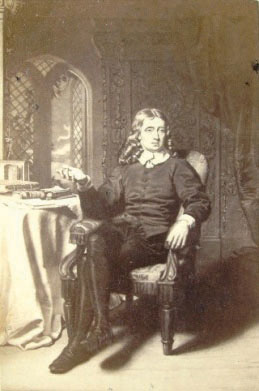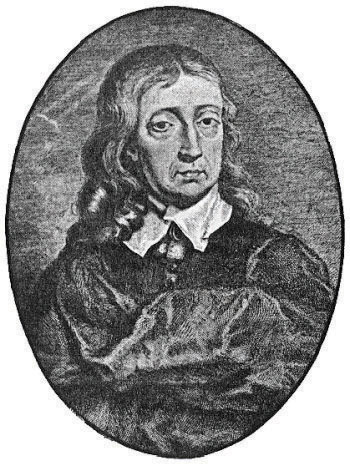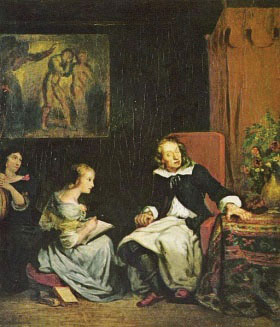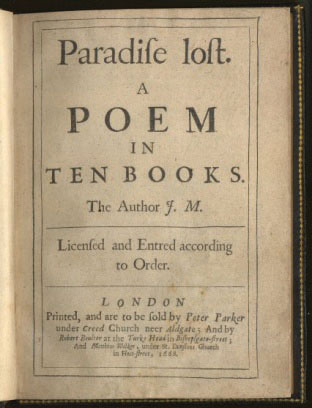This is “John Milton (1608–1674)”, section 4.5 from the book British Literature Through History (v. 0.1). For details on it (including licensing), click here.
For more information on the source of this book, or why it is available for free, please see the project's home page. You can browse or download additional books there. To download a .zip file containing this book to use offline, simply click here.
4.5 John Milton (1608–1674)
PLEASE NOTE: This book is currently in draft form; material is not final.
Learning Objectives
- Recount how the Puritan Revolution affected Milton’s literary career.
- List the types of literature Milton wrote and provide examples.
- Define epic and identify the characteristics and conventions of an epic.
- Apply the definition of epic to Milton’s Paradise Lost.
Biography
Born into a financially prosperous middle class family, John Milton was well educated, receiving degrees from Cambridge University. After completing his MA with honors, Milton moved to his father’s home where he spent several years in private study and writing. He also, like most well-to-do young men, undertook an extended trip to the continent, returning to England when civil war seemed imminent.

Referred to as the great Puritan poet, Milton found his fortunes went up and down with the rise and fall of Cromwell’s commonwealth. He accepted a government post as a translator under the commonwealth government, writing treatises supporting republicanism and Oliver Cromwell. During this period, Milton lost his vision and was forced to continue his writing by dictating to assistants, including poet Andrew Marvell. Following the Restoration, a warrant was issued for Milton’s arrest because of his support of Cromwell and the commonwealth government. Milton was arrested and imprisoned for a time until friends, again including poet Andrew Marvell, intervened and won his release, possibly saving Milton from execution. Milton retired to a small cottage in Chalfont St. Giles, where he continued to write until his death in 1674.

In 2008, Christ’s College, Cambridge created a Milton website as part of a celebration of Milton’s 400th birthday. It includes an abundance of information about Milton as well as an interactive study resource on Paradise Lost titled Darkness Visible.

Milton Dictates to His Daughters Delacroix.
Milton’s Literature
Milton wrote several types of literature:
-
poetry
- lyric poems
- sonnets
- longer poems such as “L’Allegro” and “Il Penseroso”
- his elegy Lycidas, written in memory of his friend Edward King
- his most famous work, the epic poem Paradise Lost
- a masquea form of entertainment for the court involving singing and dancing as well as acting, usually with elaborate costumes and sets, a form of entertainment for the court involving singing and dancing as well as acting, usually with elaborate costumes and sets. The lords and ladies of the court sometimes took part in a masque as well as professional entertainers. Milton’s masque Comus, unlike the traditional masque, was not performed at court but in the castle of a nobleman. Its subject was the virtue of chastity rather than the more risqué subjects found in most masques.
- prose works on political and religious topics such as his Divorce Tracts and Areopagitica, a pamphlet arguing for freedom of the press
Texts
- “Books by Milton, John.” Project Gutenberg.
- “The John Milton Reading Room.” Thomas Luxon, Professor of English. Dartmouth College.
- “Selected Poetry of John Milton (1608–1674).” Representative Poetry Online. University of Toronto.

Paradise Lost Text
- Paradise Lost. Project Gutenberg.
- Paradise Lost. The 12-Book 1674 Edition. Michael E Bryson, Department of English. California State University, Northridge.
- Paradise Lost. “The John Milton Reading Room.” Thomas Luxon, Professor of English. Dartmouth College.
- Paradise Lost (1667). Judy Boss. Renascence Editions. text of 1667 edition with 10 books.
Paradise Lost
Milton had long contemplated writing an epic poem before he began Paradise Lost. He first thought of making the Arthurian legends its topic. Then he decided to write about the fall of man—”of man’s first disobedience.” Paradise Lost is considered the greatest epic written in the English language.
The Epic
An epica long narrative poem in elevated style depicting the heroic adventures of a valiant, superhuman individual is a long narrative poem in elevated style depicting the heroic adventures of a valiant, superhuman individual.
Examples of epics include
- Homer’s the Iliad and the Odyssey
- Virgil’s Aeneid
- Beowulf
- The Song of Roland
- Milton’s Paradise Lost
Epics share the following characteristics:
- an epic hero: an historical or legendary individual capable of great deeds that are important to his/her people
- setting: a place of historical or legendary significance at a time crucial to the people of the story
- action: valiant feats requiring great courage and massive strength (physical or, sometimes, psychological)
- supernatural forces: mythological or supernatural figures that intervene in human events
-
style: an imposing, formal style that includes the use of literary and metrical techniques to convey a sense of eloquence and gravity, such as the caesura in Beowulf and in Paradise Lost
- enjambmenta sentence that continues from one line into another in a poem, continuing a thought over two or more lines rather than ending each sentence at the end of each line of poetry (end-stopped poetry)—a sentence that continues from one line into another in a poem, continuing a thought over two or more lines rather than ending each sentence at the end of each line of poetry (end-stopped poetry)
- inversionchanging the normal word order of a sentence—changing the normal word order of a sentence
- elisionomitting a letter or syllable of a word to maintain the meter of a line of poetry—omitting a letter or syllable of a word to maintain the meter of a line of poetry
In addition to these characteristics of epics, epics share a group of conventionstraditional features that are usually employed in a particular genre, traditional features that are usually employed in a particular genre:
- a statement of theme at the beginning of the poem
- the invocation of a muse to inspire and instruct the poet
- a narrative opening in medias resbeginning a narrative in the middle of the action (beginning a narrative in the middle of the action)
- cataloguesa formal list of items such as battleships or warriors (formal lists of items such as battleships or warriors)
- extended formal speeches by the main characters
- epic similessimiles several lines long and developed in great detail (similes several lines long and developed in great detail)
Key Takeaways
- Milton is known as the great Puritan poet.
- Milton wrote a variety of literature including lyric poetry, sonnets, long poems, a masque, an elegy, prose, and the great epic Paradise Lost.
- Paradise Lost displays the characteristics and conventions of the classical epic genre.
Exercises
Identify the characteristics and conventions you find in Paradise Lost:
- epic hero: Literary scholars have not agreed on who the epic hero is in Paradise Lost—or if it has a hero. A clearly heroic figure such as Odysseus or Beowulf is not obvious in Paradise Lost. What reasons could you give for considering Satan, Christ, or Adam as the hero? What reasons would disqualify each character for that designation?
- setting: In what locations do the scenes in Paradise Lost take place? In Book I, describe the scene in which the action begins.
- action: What characters in Paradise Lost could be considered as taking heroic action? Some critics describe Satan as an anti-hero; why?
- supernatural forces: What supernatural forces take part in the action of Paradise Lost?
- style: Describe the style of Paradise Lost. Find examples of literary techniques that add to the elevated, formal style of Paradise Lost such as enjambment, inversion, and elision.
- theme: Locate the introductory lines in which Milton states the theme of Paradise Lost.
- invocation to the muse: What is a muse? What muse does Milton invoke?
- in medias res: In the argument for Book I, Milton states that he plans to open in medias res. After the introductory lines, what is the scene when the action begins in Paradise Lost?
- catalogues: A classical epic might provide a list of warriors in a great battle; what list of names does Milton provide in Book I of Paradise Lost?
- extended formal speeches: Locate examples of formal speeches by Satan and Adam.
- epic similes: Locate examples of epic similes.
Resources
Biography
- “John Milton (1608–74).” John Milton 400th Anniversary Celebrations. Christ’s College, Cambridge University.
- “John Milton & Seventeenth-Century Culture.” From the collections of Thomas Cooper Library based on an exhibit by Patrick Scott. University Libraries Rare Books & Special Collections. University of South Carolina.
- “Life of John Milton (1608–1674).” Anniina Jokinen. Luminarium.
Texts
- “Books by Milton, John.” Project Gutenberg.
- “The John Milton Reading Room.” Thomas Luxon, Professor of English. Dartmouth College.
- Open Milton. Open Knowledge Foundation.
- “Selected Poetry of John Milton (1608–1674).” Representative Poetry Online. Ian Lancashire. Department of English, University of Toronto. University of Toronto Libraries.
Paradise Lost Text
- Paradise Lost. Project Gutenberg.
- Paradise Lost. The 12-Book 1674 Edition. Michael E. Bryson, Department of English. California State University, Northridge.
- Paradise Lost. The John Milton Reading Room. Thomas Luxon, Professor of English. Dartmouth College.
- Paradise Lost (1667). Judy Boss. Renascence Editions. text of 1667 edition with 10 books.
Audio
- “The Lady Margaret Lectures 2008.” Lecture podcasts. John Milton 400th Anniversary Celebrations. Christ’s College, Cambridge University.
- Paradise Lost. LibriVox.
- Paradise Lost. Podcasts of the Readings. John Milton 400th Anniversary Celebrations. Christ’s College, Cambridge University.
- Paradise Lost Audiotexts. John Rumrich. University of Texas.
Video
- “John Milton.” Dr. Carol Lowe. McLennan Community College.
Images
- The Iconography of Paradise Lost. George Klawitter. St. Edwards University. Austin, Texas.
- “Milton in the Old Library: 400th Anniversary Exhibit.” John Milton 400th Anniversary Celebrations. Christ’s College, Cambridge University. Images from a Cambridge University library exhibit, including images of first editions of Milton’s works and illustrations of Paradise Lost.
- Paradise Lost Illustrated. Don Ulin. University of Pittsburgh.
- “The Paradise Lost of Milton with illustrations.” Designed and engraved by John Martin, 2 vols, 1827. Online Gallery: The Writer in the Garden. The British Library.
Additional Information
- Darkness Visible: A Resource for Studying Milton’s Paradise Lost. John Milton 400th Anniversary Celebrations. Christ’s College, Cambridge University. an interactive source including information on Paradise Lost, Milton’s biography, Milton’s views on religion and politics, influences Milton has had on subsequent literature, illustrations of Paradise Lost, Milton’s language, and critical information.
- “History of the Masque Genre.” John Milton’s A Maske or Comus. Helen L. Hull, Meg F. Pearson, and Erin A. Sadlack. University of Maryland, College Park.
- “John Milton’s Areopigitica.” Taking Liberties: The Struggle for Britain’s Freedoms and Rights. The British Library.
- “Milton’s Works.” John Milton 400th Anniversary Celebrations. Christ’s College, Cambridge University. Lists of Milton’s works alphabetically and chronologically.
- The Poetry of John Milton. Dr. John Rogers, Yale. Open Yale video course. 24 video lectures. Academic Earth.




